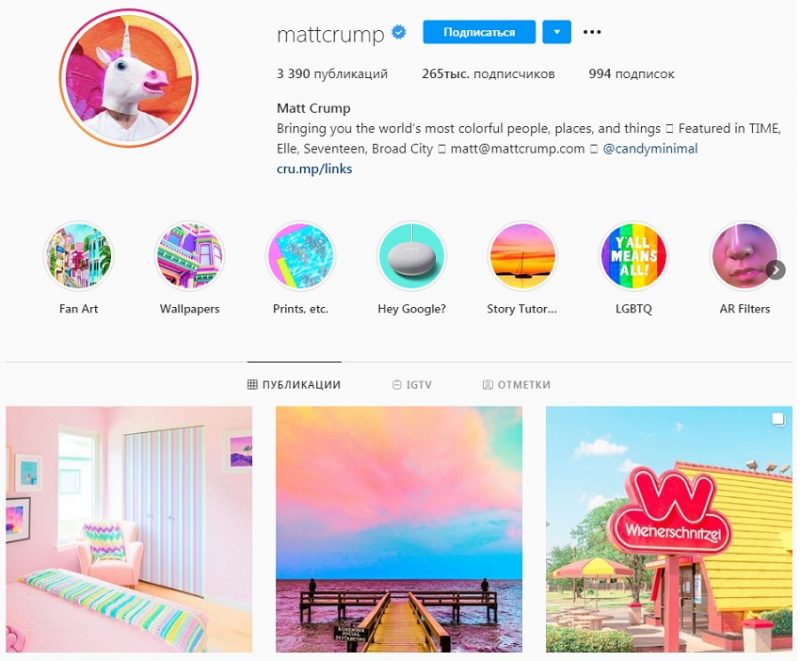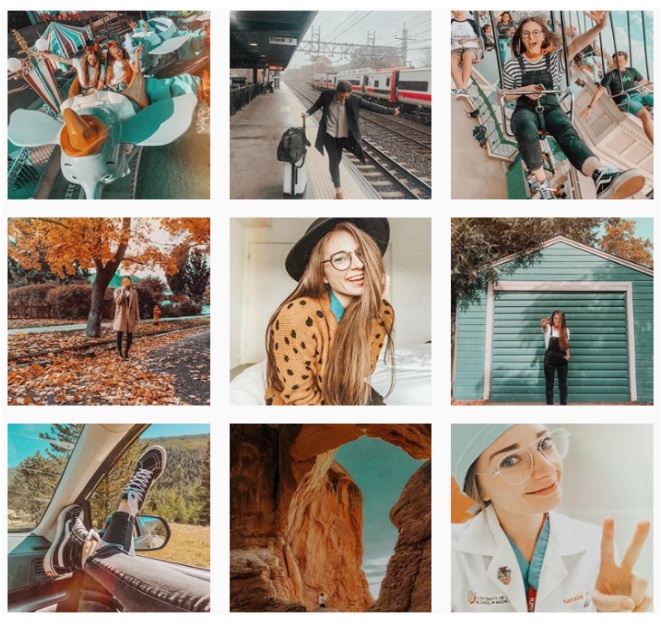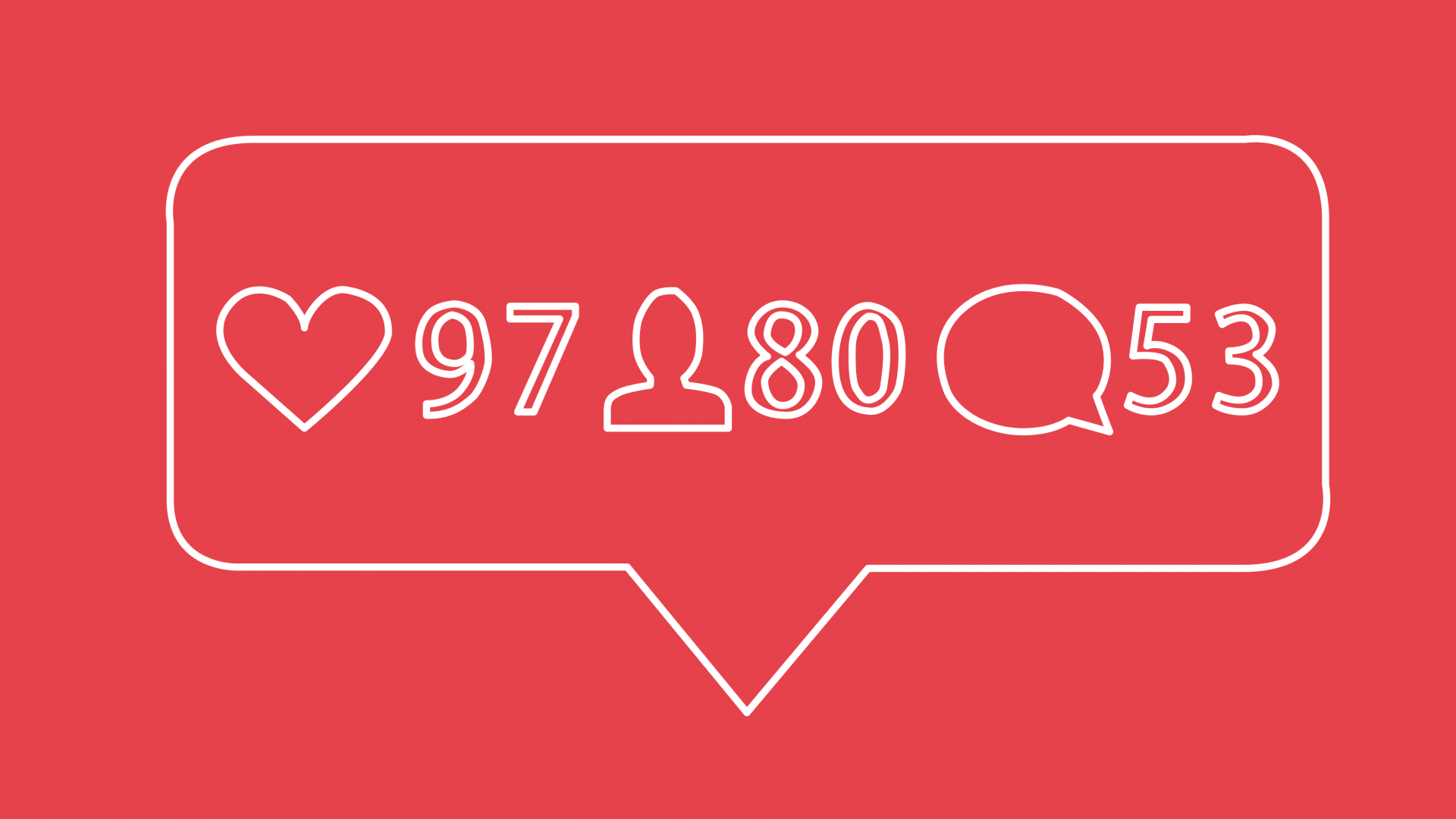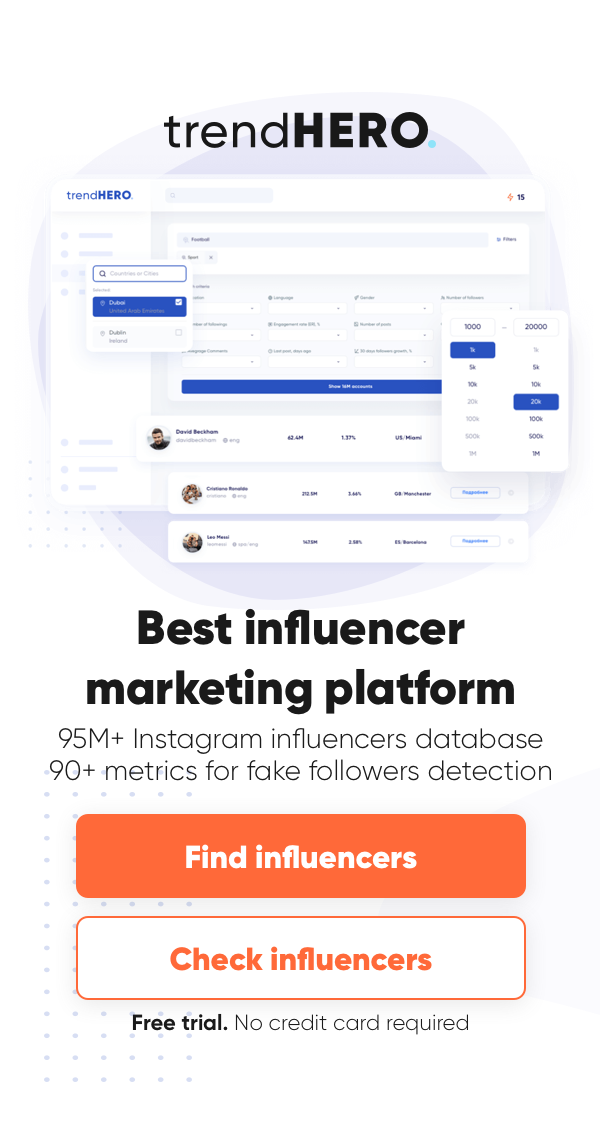- Home
- BLOG
- Influencers
- How to Get Influencers to Promote Your Product
According to Mediakix, influencer marketing offers the highest ROI. Nearly 90% of marketers admit that it’s significantly better than any other method of advertising. Influencer marketing works because you partner with people your target audience knows, loves, and trusts. These are the key prerequisites for any purchasing decision. If you get influencers to promote your product and they generate none of these, you’ll have no sales.
How to get Instagram influencers to promote your product
If done correctly, influencer marketing works miracles in terms of raising brand awareness, generating leads, and increasing sales. You don’t have to take my word for it; statistics say it all:
- one in four teenagers trusts recommendations offered by influencers more than celebrities;
- 49% of purchasing decisions are made based on influencers’ recommendations;
- partnering with influencers helps to avoid banner blindness, ad blocks, etc.
But where do you start? How do you get this engine going? How do you make sure both you and your potential partner are on the right path? Let’s see, shall we?
1. Get your profile ready

Your Instagram marketing campaign doesn’t start with looking for content creators to partner with. It starts with your own profile. Normally, there are three main things you have to take care of before setting things in motion:
1. Profile customization.
At this point, it should come as no big news that your IG profile as a brand must give people a very clear idea of what your company is about and what kinds of products/services you offer. It shouldn’t take a long time but will make a huge difference:
- Upload an original profile picture. Using your company logo might be the best solution.
- In the bio section, tell the world about your brand: what you do, what you offer, what’s your location, your shipping policy, etc. Adding a few words about why you stand out and what makes you special for your clients wouldn’t hurt. Don’t forget about adding a link to your website or other social media profiles.
- Use Highlights. Since Instagram allows adding only one active link in a bio, Highlights is a great way to help other users navigate through your profile, as well as add more info and your customers’ feedback.
2. Business account.
Setting up a business account for a brand’s IG profile is a must. It opens access to extremely useful features:
- extended analytics on publications and followers;
- easy methods of communication with customers;
- post promotion using Instagram’s inbuilt tools.
So waste no time and set up a business account as soon as possible.
3. Relevant content.
There are two principal rules for good content: it must be consistent and relevant. Preparing a content plan is important but you shouldn’t stop there. A content plan is nothing if you don’t react to current trends and news.
Content doesn’t just mean posts. Create 3 to 8 Stories a day (and make sure you publish them at certain times), do live streams from time to time.
2. Set your marketing campaign goals
Once the first step is complete, it would be great to have a clear picture of what your campaign goals are. What is it you want it to do exactly? Maximum reach to raise brand/product awareness or generating leads and increasing sales?
To determine your goals, you must know what your target audience is and what your product/service specific characteristics are. Keep in mind that Instagram isn’t the only perfect channel and it doesn’t work for any brand. If you are convinced that it’s much easier and more effective to show your product than write volumes about it, Instagram might work for you.
3. Find influencers

Finding an influencer within your niche and starting a mutually beneficial partnership is like bumping into a goldmine. It’s not an easy thing to do but once that’s accomplished, you’ll get loyal customers genuinely interested in your brand’s products.
Selection
Choose influencers based on your marketing campaign goals. For example, is attracting an interested audience what you have in mind? Find content creators who like to interact with their audience, and have built a trusting, friendly relationship with them. Even if they don’t have a massive following, the level of trust their followers have for recommendations they offer is over the top.
Do you want to maximize your reach? Say, for introducing a new product to the market or building up your brand influence. In this case, bloggers with larger followings would be a better choice. Yes, their prices are usually higher, but the payoff won’t disappoint.
Filtering
A large following doesn’t reflect the level of influence a content creator projects on their audience. Many marketers learned this truth the hard way, after partnering with macro-influencers and getting next to nothing in return. What you need to look out for is not the number of followers but rather the quality of the audience.
Getting a huge but inauthentic audience is extremely easy. But what you get as a result is lifeless phantoms, not actual human beings genuinely interested in your content. They buy nothing. They show no interest in anything. They are just empty numbers. This means that advertising your products with influencers with fake followings is completely pointless.
When finding bloggers to promote your product, look at the number of likes (and likes/followers ratio), comments, shares, Stories views. Pay attention to what they write in the comment section. Are their comments meaningful or are they just generic words and phrases?
Weed out all profiles with inauthentic activity. Sometimes it’s quite easy to spot from the get-go. Sometimes you need a deeper analysis like the one trendHERO offers.
Negotiation
More often than not, influencers are easy to talk to. Contact them using the info they offer in their profile bio, whether it’s another social media profile, an instant messenger, or an email. Be professional: get to the point straight away, without beating around the bush. It would be best to outline the task at hand as clearly and concisely as possible. Let them know you have a product/service you want to promote and ask about their terms for the cooperation of this kind. While most influencers will likely prefer monetary compensation, some might agree to a barter collaboration.
What you definitely shouldn’t do is offer payment in exposure or demand that they give you a discount. If they already have a loyal audience, you can be sure they know how to monetize this resource. Besides, they likely get a lot of offers like this every day.
Ask them to provide you with their profile statistics and examine them thoroughly. At the same time, do your own research using trendHERO instruments.
After that’s done, talk about the format of sponsored posts, the content, and the content plan in detail
4. Analyze the outcome

Even if you discussed all the specifics of your collaboration and sponsored publication in great detail, make sure your partner influencer is willing to show you the content they created before it goes live. It’s especially important when you are at the very beginning of your collaboration and if they don’t have much experience cooperating with brands.
If necessary, ask them to make changes, and don’t forget about the UTM codes in the URLs so you have the opportunity to assess the effectiveness of your campaign.
Make sure the sponsored content (a publication or a Story) was published at the time you agreed upon and then monitor the way their audience responds to it.
If you find that the outcome is less than satisfactory, don’t be too hasty to blame it on the influencer. Nobody is above making a mistake including you. So make sure you’ve chosen the right format of promo content, have the correct target audience profile, and no errors in codes and URLs. Look for the reason for supposed failure and once you think you find it, double-check it.
Tips&Tricks
Working with influencers might not be as easy as it seems. There are just too many factors to keep track of, from choosing the right creator to working on the format of sponsored content. Here are some tips that might make the entire process much easier for you.
1. Do your research
Whatever your marketing endeavor is, you must always preface it with detailed research. Influencer marketing is not an exception. Determining your target audience isn’t enough. You have to understand what their interests are, who they follow, who they listen to, who they trust.
Partnering with an influencer who has a massive army of an audience that barely overlaps with your TA is a huge mistake. That’s why you have to outline a clear target audience profile and then compare it to their average follower profile. If they are similar, this partnership makes sense.
2. Make sure that advertising with the creators you’ve chosen is really viable
You can do this by analyzing a few important factors:
- The number of followers. A small following isn’t bad if it’s completely authentic. A large following isn’t necessarily good if it’s fake.
- Audience quality. Again, fake followers don’t like, comment, or buy your products. It’s also important that their audience is loyal and doesn’t react negatively to sponsored content.
- Content quality. Follower response, loyalty, and trust largely depend on how content creators present their content. It’s great if they have their own unique style that makes them stand out.
- Experience in collaborating with brands. It’s also great if they already have some experience in promoting products and can provide you with statistics for previous collaborations and feedback from their former/current partners.
3. Sometimes, less is more
Some brands have this opinion that if they pay hefty amounts of money for advertising with celebrity influencers with millions of followers, success is guaranteed. In practice, it turns out that it doesn’t generate any profit. Actually, it doesn’t even pay off. That’s why the first thing you have to pay attention to is not the numbers but quality and engagement.
4. Choose quality over quantity

Here’s a simple example. Let’s say you represent a small publishing company and you want to promote a new book. You contact a well-known blogger, pay them a lot of money but don’t get the result you expected. So next time you contact a few creators who specialize in books (book reviewers, writers, etc.) and pay them smaller amounts of money but get a much better result. Because their audience is loyal and genuinely interested in the content they produce.
5. Make sure you discuss your partnership format in advance
There are many formats of collaboration. It might be a paid sponsorship, a barter collaboration, a quid pro quo arrangement. The terms of your agreement might be different too. Some influencers prefer to be paid per publication, some for a certain amount of likes/views/shares. Others prefer to work for a commission.
Whatever it is, you should know which format is preferable for you as a marketer and then discuss it with content creators before you start your collaboration.
6. Give them some creative freedom
Let them adapt the ads to their usual style and format of content presentation. Don’t insist on using the content you give them verbatim and don’t be afraid of creative changes. It would be much better if sponsored content is organically integrated into what they normally produce. This will ensure a positive response from the audience.
7. Give them clear instructions
One of the most important things you need to do at the start of your marketing campaign is creating clear-cut instructions for your influencers. Both parties have to know that you are on the same page. Changing partnership terms after you’ve already started collaborating is unacceptable. Make sure they fully understand what this partnership and this campaign are about. Campaign goals, the visual content you expect to see, hashtags to use, keywords, links, all this and more must be discussed in detail.
8. Pay them fairly
Some marketers count on influencers to advertise their products in exchange for products or services. This kind of strategy rarely proves to be successful in the long run. Think about it. It takes time, hard work, and sometimes money to create quality content. To make sure it stays like that, you need to pay for their work fairly and timely.
9. Make sure your partnership is transparent
Every content creator that recommends a product or a service for compensation must openly say so to their audience. There can be no exceptions. All sponsored posts on Instagram must have appropriate hashtags, such as #ad or #promo. Sure, it’s influencers who are responsible for the hashtags they use in their publications. But it’s also your responsibility as a brand to remind them that your partnership must be disclosed.
Contrary to popular opinion, but the #ad hashtag doesn’t undermine the audience’s trust in influencers in the slightest. In fact, it’s the other way around: they appreciate the honesty and trust content creators even more.
And a few more quick tips for those who are only starting to explore the opportunities Instagram has to offer in terms of influencer marketing:
- Advertising with IG bloggers will work great for you if you operate in one of the following niches: apparel, cosmetics, toys, interior design & decor, art, furniture, beauty, travel, food, restaurants.
- Niche influencers would be the best choice. Their followers are more engaged and loyal.
- Signing a legal agreement and providing a clear brief is a great idea. This means that you can always have control over the quality of content and they get peace of mind knowing their work will be properly paid.
- It makes sense to work on a CPA (Cost Per Action) model when influencers get a commission for each lead, view, or purchase.
Conclusion
Influencer marketing is as relevant as ever and simply cannot be overlooked in the current marketing climate. By partnering with content creators, marketers ensure the increase of loyalty in their potential customers, gain new audiences, and bring their content marketing to a whole new level.
If you plan to work with influencers, make sure that their audiences will be genuinely interested in what you have to offer. Don’t be afraid to adapt your content to their unique voice and style, make it more native. Only then will your potential customers’ response be resoundingly positive.
We also recommend to read
Instagram Engagement Rate Calculator For Free
Check any influencer's Engagement rate and analyze his or her followers growth history
Other free tools: Follower Count History, Instagram Follower Count, CPM Calculator






